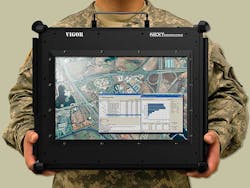Spending more on ruggedized computers can ensure against crucial data loss, survey reveals
Asked if it is worth spending more money to ensure against the risk of critical data loss, 56 percent of those responding to a survey say they strongly agree, and 35 percent say they somewhat agree. Less than 9 percent were neutral or disagreed.
These results are part of a Military & Aerospace Electronics market study on ruggedized computers, which has been conducted since late May. So far 222 readers have responded to the study. You can weigh in on the study online at www.surveymonkey.com/r/9B9M6JL.
Many of the readers who favor spending extra for ruggedized computers say they are speaking from personal experience. 54.3 percent say they or their organizations have lost crucial data due to the failure of a commercial-grade notebook or portable computer.
The majority of those responding, 36 percent, identify themselves as engineers or operations staff. Nearly 16 percent are C-level executives; 12 percent are supervisors or directors, and 11.3 percent are in upper management. the rest are IT specialists, administrators, or public safety directors.
Related: Rugged laptop computer makers take aim at unique demands of battlefield computing
With about 90 percent of respondents voicing a preference for ruggedized computers, one might wonder why only 74 percent actually deploy ruggedized computers or tablets in their environments. The answer is cost.
When asked what are some reasons why respondents are not using rugged devices, nearly 62 percent say ruggedized computers are too expensive. Nearly 32 percent blame limited sourcing for not using ruggedized computers, and 26 percent say ruggedized computers are too heavy for their applications.
Other reasons given for not using ruggedized computers are a lack of compatibility with existing equipment; a lack of detail on purchasing specifications; low return on investment; unfavorable upgrade timetables; inconvenient form factors; and problems with service.
For those using ruggedized computers, nearly 48 percent are deploying rugged notebook computers. Nearly 32 percent say they are deploying ruggedized tablet computers, and 27 percent are deploying rugged smart phones. The rest are deploying rugged workstations and large computers.
The applications respondents are serving primarily involves aerospace and defense. Of those responding 57 percent are involved in military and aerospace, nearly 24 percent are involved in industrial automation, and 19 percent are in homeland security.
Click here to take the survey on ruggedized computing
The rest are involved in public safety, power and utilities, transportation, oil and gas, construction, surveying and cartography, health care, or other industries.
Of these deployments of ruggedized computers, nearly 79 percent say using rugged computers in their applications either are extremely or very important. The rest say if is somewhat important, not important, or not a factor.
There's good reason for the importance they place on rugged and reliable computers. Of those responding, 69 percent say in-field computer failures are catastrophic or critical to their organizations. Twenty-one percent find field failures to be annoying, and the rest say field computer failures are easily handled or are not a factor.
The majority of those responding, 69 percent, say water resistance is the most important feature where it comes to ruggedized computers. Next most important is resistance to shock and vibration. Respondents say their rugged computers must be lightweight, power-efficient, and have the ability to run custom applications.
Other popular features are hot-swap batteries, GPS capability, advanced processors, Bluetooth and satellite communications capability, and the ability to accept mil-spec connectors.
Now that you've seen the results we have so far, please give us your opinion. The quick survey is online at www.surveymonkey.com/r/9B9M6JL.
To learn more about the latest in ruggedized computing, view our webcast on this topic.

